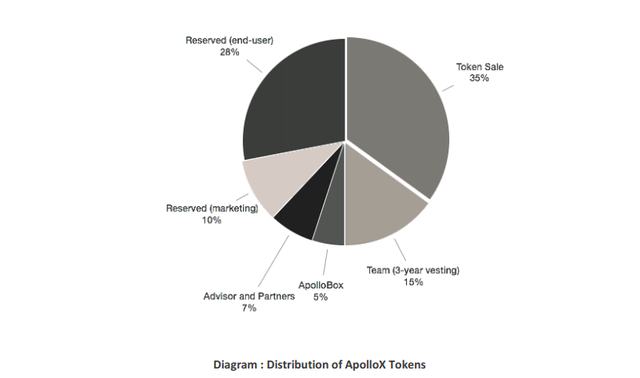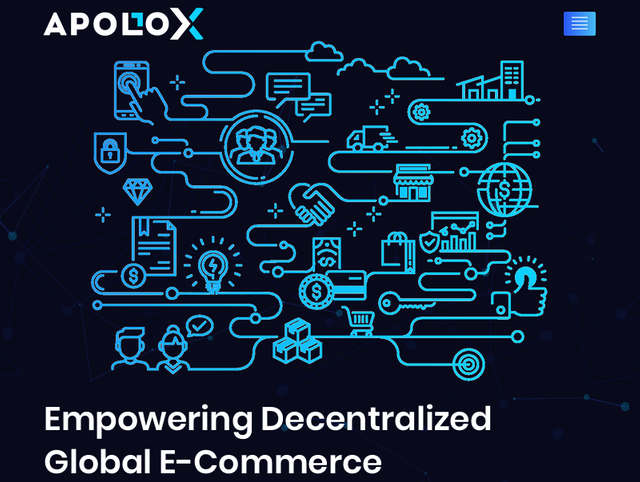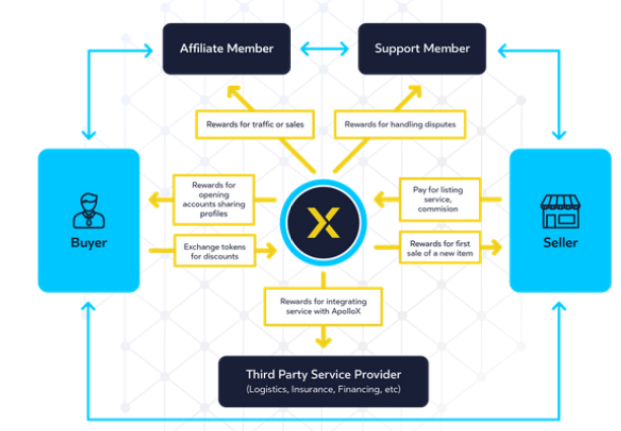APOLLOX PLATFORM : AN OVERVIEW
INTRODUCTION
It is a known fact that blockchain-based technology and decentralized processes are the key to the next generation of marketplace and online shops. Through tokenization, an e-commerce community can connect people with shared interests and aligned economic benefits, resulting in a community with high user viscosity. It also aligns the inventives between all members of the ecosystem toward further development of the network itself. One the very first platform which support this notion is ApolloX. What then is ApolloX?
☆APOLLOX PLATFORM
ApolloX is the very first blockchain solution for online e-commerce with a large number of existing participants and mainstream adoption. It also has the potential to disrupt the existing online marketplace landscape and become the first choice of online channels to sellers globally, especially new sellers with cross border selling needs. Existing marketplaces or shops may also migrate their business to ApolloX platform for cost reduction, faster customer acquisitions and better brand recognition.
ApolloX Protocol will be handled by the arbitration process of the ApolloX Protocol to ensure its transparency and fairness. As a result, customers will feel comfortable and protected while shopping on an online store powered by the ApolloX Protocol. In the event that they happen to get into trouble with a fraudulent seller, they realize that their support case will be reviewed and decided by the community through a fair and transparent process, not by the seller or any other centralized company who just profits from the success of the transaction.
All shopping data in ApolloX Protocol is permission enabled and privacy protected by encrypting all sensitive data before appending blocks to the ledger. Encrypted data can just be decrypted by a user in possession of the corresponding key. On the ApolloX Protocol, all shopping activities, including browsing, clicking and purchasing, are just accessible by the trading parties, the sellers and customers. Without gaining permission from the customers, no outsider, including the ApolloX platform, will have access to shopping behavior data. For example, a customer can choose to not leave any history of viewing an item. Alternatively, a user can also choose to voluntarily share their data with certain vendors or service providers on the
ApolloX network in order to gain personalized service or rebates. By enabling this pick in advertising, customers can control the information they receive on products or services and sellers can lower their acquisition barriers and costs because they'll have a clearer understanding of each customer.
ApolloX's service providers, users of services and owners of the platform have reached a trinity model. With this organizational structure, ApolloX is not managed by managers but rather by all the users on it, which makes it impossible for the ApolloX network to sell out user privacy data, defraud customers and harm consumer interests.
》Aligning the Incentive of Users and Platform
As consumers shop more through the ApolloX network, the overall value of the ApolloX network increases, as well as the value of ApolloX token. When someone proposes to significantly increase transaction costs on ApolloX, members of the community will realize that such behavior will reduce the overall value of ApolloX, thereby reducing the value of ApolloX token in its hands, and thus oppose such behavior. The way this organizational structure secures the interests of the organizers and participants in the community is unique to blockchain and is also the core strength of decentralized e-commerce marketplace.
》ApolloX Protocol Modules
In the decentralized e-commerce ecosystem, all transactions of money and sensitive information will be maintained by a smart contract system. ApolloX Protocol is a set of inherent functionalities for all essential e-commerce transactions and community developers are encouraged to construct more features set on top of the system. In this chapter, we will discuss in detail how each module of the ApolloX Protocol handles typical e-commerce business activities in a decentralized manner.
》Payment Protocol
ApolloX Payment Protocol handles the end-to-end payment escort process between buyers and sellers. It also supports outsider insurance and the transformation between fiat currency and cryptocurrency on ApolloX platform. ApolloX Payment Protocol can prevent a majority of online shopping scams with the help of distributed ledger and smart contracts.
》Arbitration Protocol
ApolloX Arbitration Protocol solves this issue by employing the popular Deposit-Challenge-Vote mechanic in every dispute handling to ensure transparency and independence. When two members, usually a buyer and a seller, inside the community cannot reach agreement on a case without anyone else, either one of them can open a case by depositing a smaller amount of ApolloX tokens. The opposite party is required to deposit the same amount of ApolloX for this case and provide their reasoning.
》Oracle and Data Protocol
As a platform for e-commerce business, we rely on certain outside information to keep the system running, such as logistics data and advertising data. This information will be provided to smart contracts as trusted data through the ApolloX Oracle Protocol. ApolloX Oracle Protocol opens up APIs for integration with existing logistics providers and advertising platforms. Logistics data, such as tracking numbers and delivery statuses, will be available as data oracle on apps on the ApolloX network. Advertisement data, such as attributions, will also be honored and recorded with each order on the blockchain. Of course, the vendor of those data feeds will have been carefully vetted by the community before gaining access to the protocol.

》ApolloX Token and Token Economics
The normal roles in an e-commerce ecosystem are the accompanying. In actual operations, they convert to each other or have multiple roles at the same time. For example, a region distributor is a buyer to his upstream factory and a seller to his customers.
Buyer: Refers to the role of purchasing products in the e-commerce system. A buyer pays a certain amount of money and expects the purchased item to be delivered on time. For a buyer, the quality, price and cost effectiveness of the item are the most important factors to consider when making a purchasing decision.
♢Seller: Refers to the role of selling products in e-commerce systems. Sellers often have their own channels of purchasing and rely on trading spreads to make profits. For sellers, the goal is to increase the price margin of the item and acquire customers at a lower cost.
♢Service Provider: A service provider refers to the role of giving sellers an advertising service or logistics service. This includes search advertisements, click advertisements, email advertisements, social influencers advertisements and so on.
♢Platform: Refers to the business managing the online website inside the traditional e-commerce system. A traditional marketplace usually provide sellers with a series of service integration plans and takes a large commission from the seller's sales. On the ApolloX platform, ApolloX Protocol replaces the traditional platform to connect sellers and buyers without being a middleman for information or payment. The system provides a platform for peer-to-peer cooperation among various roles.
For more information visit:
Website: https://www.apollox.network/
Ann Thread: https://bitcointalk.org/index.php?topic=4650252
Whitepaper: http://www.apollox.network/downloads/ApolloX_whitepaper_v1.0.pdf
Telegram: https://t.me/apolloxgroup
Twitter: https://twitter.com/apolloX_network
Facebook: https://www.facebook.com/apolloxnetwork/
Reddit: https://www.reddit.com/r/ApolloX
#ApolloXICO #cryptocurrency #blockchain #e-commerce
Authored by Solman: https://bitcointalk.org/index.php?action=profile;u=1903032
Public key: 0xCf9da57D7455aFBD22537a533FE86B880436EE54

